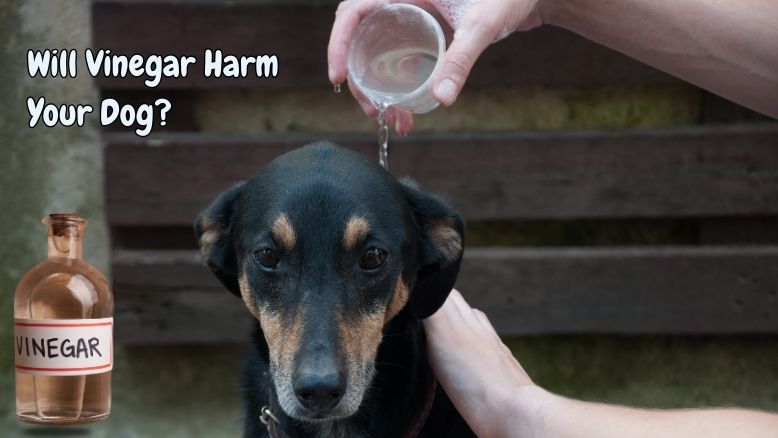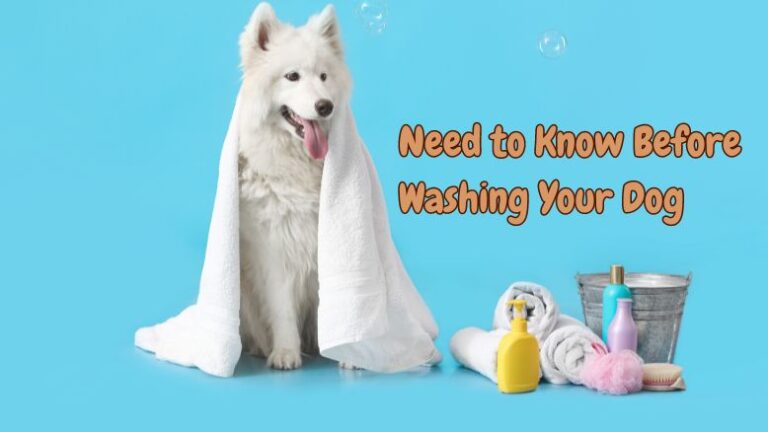
Vinegar, one of the most commonly used ingredients in the household for different purposes, often gives rise to worry among pet owners regarding its safety for cats and dogs.
As a pet owner, you have many duties like cherishing your pet’s health is one of them.
Vinegar, often sour to taste and pungent when smelled, is mostly derived from ethanol fermentation.
As it contains acetic acid, it gives vinegar its characteristic sharp smell. We have multiple uses for this versatile item – from cooking, and cleaning to even as a home remedy, vinegar comes in many forms; white vinegar, apple cider vinegar, and balsamic vinegar.
Is Vinegar Bad for Dogs to Smell?
Dogs will not experience harmful effects from the vinegar smell, but it is not your job to make that smell any more pleasant for them. This obnoxious bitter smell of the vinegar can throw many strong-smelling animals off their routine, and the animals may show resistance or discomfort by coughing, sneezing, or any other signs of discomfort. As a dog inhales either small or big amounts of the vinegar which is mostly its scent, this may still not pose any major risk. However, exposing the dog for an extensive period to the strong vinegar fumes could irritate the dog’s respiratory system.
The most important thing is that the dog cannot ingest vinegar because its effects can cause gastrointestinal upset, including nausea, vomiting, and diarrhea.
In terms of allergies or skin sensitivities in baby dogs, they may start to cry and lick if they come into contact with vinegar.
Dog owners should restrict dogs from using strong-smelling substances such as vinegar and well-ventilated areas if vinegar needs to be used around pets for cleaning and other purposes.
It is recommended that if the dog shows signs of anxiety or discomfort after exposure to vinegar, the owner goes to the vet for expert advice.
Can You Wash Your Dog with Vinegar?
Yes, you can wash your dog with vinegar but the process must be properly conducted by diluting the mixture. Vinegar can perform well against odor control and has antiseptic properties.
Prepare a weak solution by mixing one part of white vinegar with five parts of regular water.
Make sure to avoid getting vinegar in your dog’s eyes, ears, or inside the nose, cause it is irritating.
Test a little piece of your dog’s skin before the whole area with vinegar to prevent your dog from having a negative reaction from it.
Washing with the vinegar solution, then rinsing with water to eradicate any remnants is what needs to be followed next.
The vinegar’s properties are helpful, but it does not replace shampoo when dogs have skin problems or these have inflammations.
When trying out new grooming techniques on a pet, one is always advised to seek clinical advice from a veterinarian before taking any action.
Can You Spray the Dog with Vinegar for Smell?
Compared to the popular belief that dogs should be sprayed with vinegar, as a quick and natural remedy for keeping the odor under control, this is not recommended to all dog owners by the majority.
The acidic nature of vinegar could be useful in nullifying certain odors, but it may not work in all cases involving smells arising from illnesses conditions.
In addition, using vinegar as a deterrent is likely to place dogs in discomfort and might even irritate them due to its awful odor.
It is just as vital to ponder over the dog’s skin ware and consult a veterinarian before using any home treatment.
Most professional groomers and veterinarians recommend a bath once a month or so, using a shampoo specifically formulated for dogs, as a routine regimen to effectively control a dog’s odor.
Your pet’s safety and comfort should always be on your mind as you choose a solution to their unpleasant odors.
Is Vinegar Safe for Dogs Skin?
It’s good for the dog’s skin as long as it’s used properly, but it is essential to be diluted.
Apple cider vinegar is one of the most popularly recommended treatments for skin issues due to its antimicrobial nature which aids with itchiness and fungal infections.
However, it is unsuitable in its undiluted form, or if wounds are applied, it can cause discomfort or pain for your pet.
Ensure you have your veterinarian’s advice in advance when using vinegar or any other homemade remedy on your pet’s skin lest you later discover it was inappropriate for their skin condition.
Moreover, make sure to follow up with your pet and see if there are any adverse effects from the use of the product so that if it is the case, you might opt to discontinue use and avoid worsening symptoms.
Is Vinegar Safe for Dogs Eyes?
Vinegar is not advisable for the eyes of dogs.
The vinegar that is usually used as a housecleaner, with its acidic properties, can lead to irritation, redness, and discomfort if it is spilled to the dog’s eyes.
If your dog’s eyes have an infection or irritation, that’s pretty serious. So, you should go to the vet to get an accurate diagnosis and treatment.
Employing ophthalmic solutions meant for dogs in preference to those recommended by vets is safe and directly effective in combating eye problems among pets.
For the sake of your dog’s welfare, make sure that you involve a professional in case medical issues occur.
Is Vinegar Safe for Dogs Ears?
The same vinegar solution can be used to clean your dog’s ears, but one should dilute it with water to lessen irritation.
Use ratios of vinegar and water 1:1, soak a cotton ball in it, and start to wipe the inside of your dog’s ears.
Nevertheless, ensure you receive the green signal from your veterinarian before administering any home remedies to your pet. Now, vinegar helps to create alkaline settings that inhibit the growth of bacteria.
However, this solution may not be practical for all dogs, mainly for dogs with sensitive skin and other inner ear problems.
Is Vinegar Safe for Dogs to Lick?
Generally, vinegar is ok for dogs but in excess and usage as a treat, it is not advisable.
Some pet owners apply vinegar in cleaning for instance as a deterrent while chewing.
Still, dogs could get upset in the gastrointestinal tract and experience vomiting or diarrhea if the dogs consume more of it.
Additionally, the smell and taste that is not a favorite to some dogs can also repel them from licking it in the first place.
Is Vinegar Safe for Dogs to Eat?
Vinegar can be safe for dogs in amounts that are not large, but the use of it as a regular part of their diet is not advisable.
Many pet owners use it as a natural remedy for different diseases that can develop in their pets.
While it is OK to use it for that purpose, in excessive amounts it can cause damage to the stomach or gastrointestinal tract because of its acidic nature.
On the other hand, vinegar, for instance, apple cider vinegar, is considered to be healthy for canines only if they are used moderately and under a veterinarian’s recommendation.
Conclusion
Lastly, vinegar is safe for dogs provided it is used just right and in small quantities.
Apart from a typical unpleasant odor of vinegar, the vinegar scent should not be dangerous even only from sniffing it.
Nevertheless, it should be noted that vinegar concentrates should be used with some degree of care as they could irritate a dog’s skin, eyes, nose, and throat.
With vinegar dilution, proper ventilation of the area, and monitoring your dog’s reaction, you can blend vinegar with the day-to-day house routine even without running the risk of endangering your pet.
If your dog has any concerns regarding using vinegar around them, talk to your veterinarian and ask for individualized advice and recommendations.




